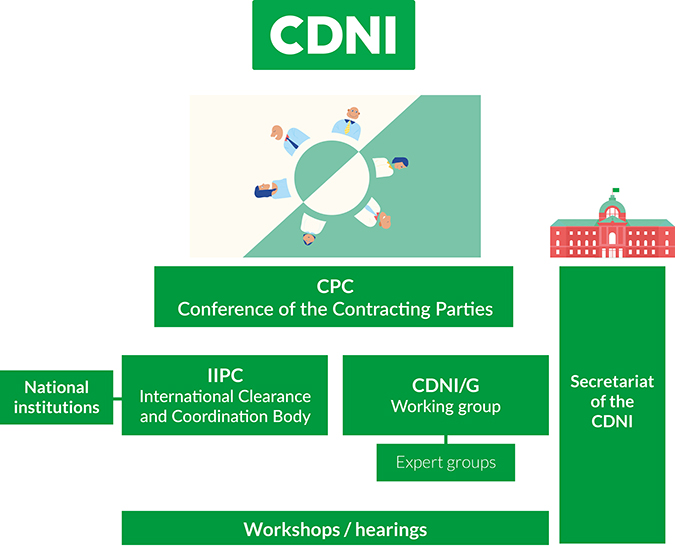The Conference of the Contracting Parties (CPC)
The contracting States sit twice a year within the Conference of the Contracting Parties (CPC). The CPC is the CDNI’s supreme body. The CPC:
- unanimously examines and decides on amendments to be made to the Convention and to its annexes;
- adopts resolutions (annual financial clearance, setting of the amount of the disposal charge, work programme, etc.)
- decides on the annual budget (to which the States contribute equal shares);
- resolves disputes concerning the interpretation and application of the CDNI;
- monitors the application of the Convention’s provisions;
- makes recommendations to the States concerning changes to the network of reception stations.
In addition to the representatives of the States the following representatives may also take part in the CPC as observers:
- national institutions (NI),
- observer States and
- international organisations.
In 2024-2025, the CPC is chaired by Mr Alexis Koltsidas, member of the Swiss delegation.
The working group CDNI/G
The CPC is supported by a working group CDNI/G, which does the preparatory work: draft resolutions, impact analyses, FAQ, information brochures, and any other working document that assists with CPC decision-making. This working group is made up of delegations from the Contracting States and representatives of the approved organisations.
In 2024-2025, the working group is chaired by Ms Muriel Bouldouyré, a member of the Belgian delegation.
The International Clearance and Coordination Body (IIPC)
The International Clearance and Coordination Body (IIPC) is the dedicated body for implementing Part A (oily and greasy waste). It is responsible for:
- ensuring financial clearance between the national institutions,
- reviewing the need to make changes to the reception station network,
- conducting the annual evaluation of the financing system and disposal charge: it submits a public annual report.
- submitting, based on the annual evaluation, modification proposals or recommendations submitted to the CPC.
The IIPC’s composition is unusual: the inland navigation profession enjoys a special status.
Each delegation comprises two representatives of each national institution (which is the body responsible for organising the collection and management of the financing system), one of whom is a representative of the profession.
The IIPC is chaired by the executive Secretary of the CDNI, Mr Jörg Rusche.
Rules of Procedure
The functioning of these bodies is governed by the Rules of Procedure:



- Rules of Procedure of the Conference of the Contracting Parties (CPC)
- Rules of Procedure of the International Clearance and Coordination Body (IIPC)
- The CDNI’s financial regulations
The CDNI Secretariat
The CDNI’s Secretariat function is provided by the Secretariat of the Central Commission for the Navigation of the Rhine (CCNR). Its role aims to:
- ensure the smooth functioning of the Convention by preparing and organising its meetings,
- ensuring good coordination between various bodies,
- providing the necessary support for decision-making by the States,
- representing the CPC vis-à-vis other international organisations,
- communicating and disseminating information on the CDNI to the interested public.

